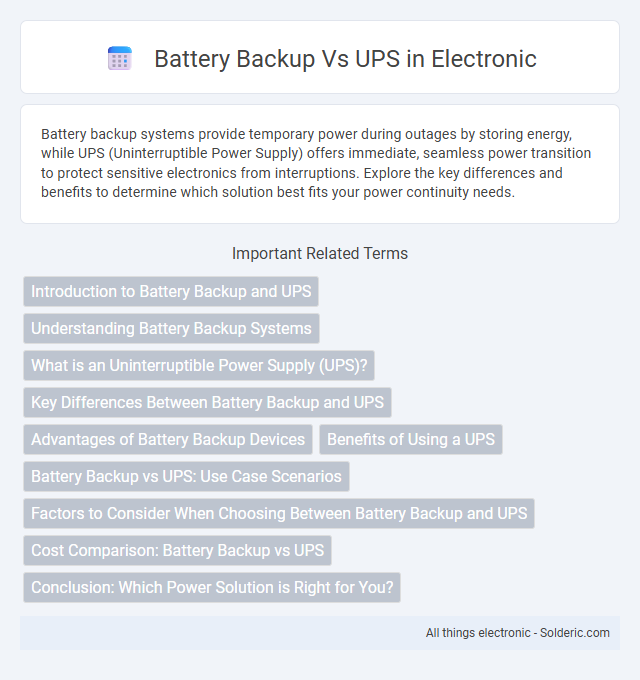Battery backup systems provide temporary power during outages by storing energy, while UPS (Uninterruptible Power Supply) offers immediate, seamless power transition to protect sensitive electronics from interruptions. Explore the key differences and benefits to determine which solution best fits your power continuity needs.
Comparison Table
| Feature | Battery Backup | UPS (Uninterruptible Power Supply) |
|---|---|---|
| Primary Purpose | Provides temporary power during outages | Ensures continuous power and regulates voltage |
| Power Protection | Limited to power backup | Power backup + surge protection + voltage regulation |
| Activation Time | May have brief delay | Instantaneous power switching |
| Typical Usage | Small electronics, limited backup | Computers, servers, critical systems |
| Battery Type | Usually sealed lead acid or lithium-ion | Sealed lead acid, lithium-ion or advanced types |
| Voltage Regulation | No | Yes |
| Surge Protection | No | Yes |
| Runtime Duration | Short (minutes) | Short to moderate (minutes to an hour) |
| Cost | Lower | Higher |
Introduction to Battery Backup and UPS
Battery backup systems provide temporary power during outages by using rechargeable batteries to keep essential devices running. Uninterruptible Power Supplies (UPS) incorporate battery backup with surge protection and voltage regulation to ensure continuous and stable power delivery. While both systems prevent data loss and hardware damage, UPS units offer enhanced reliability for critical equipment by instantly switching to battery power without interruption.
Understanding Battery Backup Systems
Battery backup systems provide temporary power during outages, relying on rechargeable batteries to maintain the operation of essential devices. Unlike UPS (Uninterruptible Power Supply) systems, battery backups typically offer limited surge protection and shorter runtime, making them suitable for less critical electronics. These systems ensure continuity for devices like modems, routers, and small appliances by supplying power long enough to save data or safely shut down equipment.
What is an Uninterruptible Power Supply (UPS)?
An Uninterruptible Power Supply (UPS) is a critical device that provides immediate backup power to electronic equipment during power outages or fluctuations, ensuring continuous operation and protecting against data loss. Unlike a simple battery backup that only supplies power temporarily, a UPS also conditions incoming power to prevent damage from surges, sags, or spikes, making it essential for sensitive devices like computers and servers. Modern UPS systems use advanced technology such as line-interactive or online double-conversion methods to deliver stable, clean power and seamless switchover without interruption.
Key Differences Between Battery Backup and UPS
Battery backup primarily provides short-term power during outages, allowing your devices to continue running momentarily. A UPS (Uninterruptible Power Supply) combines battery backup with surge protection and voltage regulation, ensuring a stable power supply and safeguarding sensitive electronics. The key differences lie in functionality and protection level, with UPS offering comprehensive power management beyond simple backup.
Advantages of Battery Backup Devices
Battery backup devices provide reliable short-term power during outages, protecting sensitive electronics from data loss and damage. They offer a cost-effective solution compared to full Uninterruptible Power Supply (UPS) systems, making them ideal for home offices and small-scale applications. Battery backups also have lower maintenance requirements and extend device lifespan by preventing sudden power interruptions.
Benefits of Using a UPS
A UPS (Uninterruptible Power Supply) provides immediate power backup during outages, ensuring continuous operation of sensitive electronic devices and preventing data loss. It offers surge protection to safeguard equipment against voltage spikes and fluctuations, extending the lifespan of hardware. By delivering consistent, clean power, a UPS enhances system reliability and minimizes downtime in both home and business environments.
Battery Backup vs UPS: Use Case Scenarios
Battery backup systems are ideal for short-term power outages and preserving data on personal computers, providing limited runtime and basic surge protection. UPS (Uninterruptible Power Supply) units are essential for critical business environments, offering instant power switch-over, voltage regulation, and extended runtime options to maintain servers, networking equipment, and medical devices. Selecting between battery backup and UPS depends on the required power duration, equipment sensitivity, and the need for clean, stable power supply during interruptions.
Factors to Consider When Choosing Between Battery Backup and UPS
When choosing between a battery backup and a UPS, consider the power capacity required to support your devices during outages and the duration of runtime needed for uninterrupted operation. Evaluate the type and sensitivity of your equipment, as UPS systems offer voltage regulation and surge protection, while basic battery backups may only provide temporary power. Your budget and the importance of preventing data loss or hardware damage also play crucial roles in determining the most suitable solution.
Cost Comparison: Battery Backup vs UPS
Battery backups typically cost less upfront than uninterruptible power supplies (UPS), making them a budget-friendly option for basic power protection. UPS systems, while more expensive initially, offer advanced features like voltage regulation and surge protection that can prevent costly damage to sensitive electronics. Evaluating your power continuity needs and device sensitivity helps determine which investment best protects your equipment and aligns with your budget.
Conclusion: Which Power Solution is Right for You?
Battery backup systems provide short-term power during outages, ideal for protecting sensitive electronics and ensuring an orderly shutdown, while UPS units offer comprehensive surge protection and instant power delivery for critical devices. Assessing your power needs, device sensitivity, and outage frequency helps determine the best solution, with UPS favored in environments requiring uninterrupted power and battery backups suited for less critical, temporary power support. Investing in the right system maximizes equipment safety and operational continuity based on your specific energy demands.
Battery backup vs UPS Infographic

 solderic.com
solderic.com